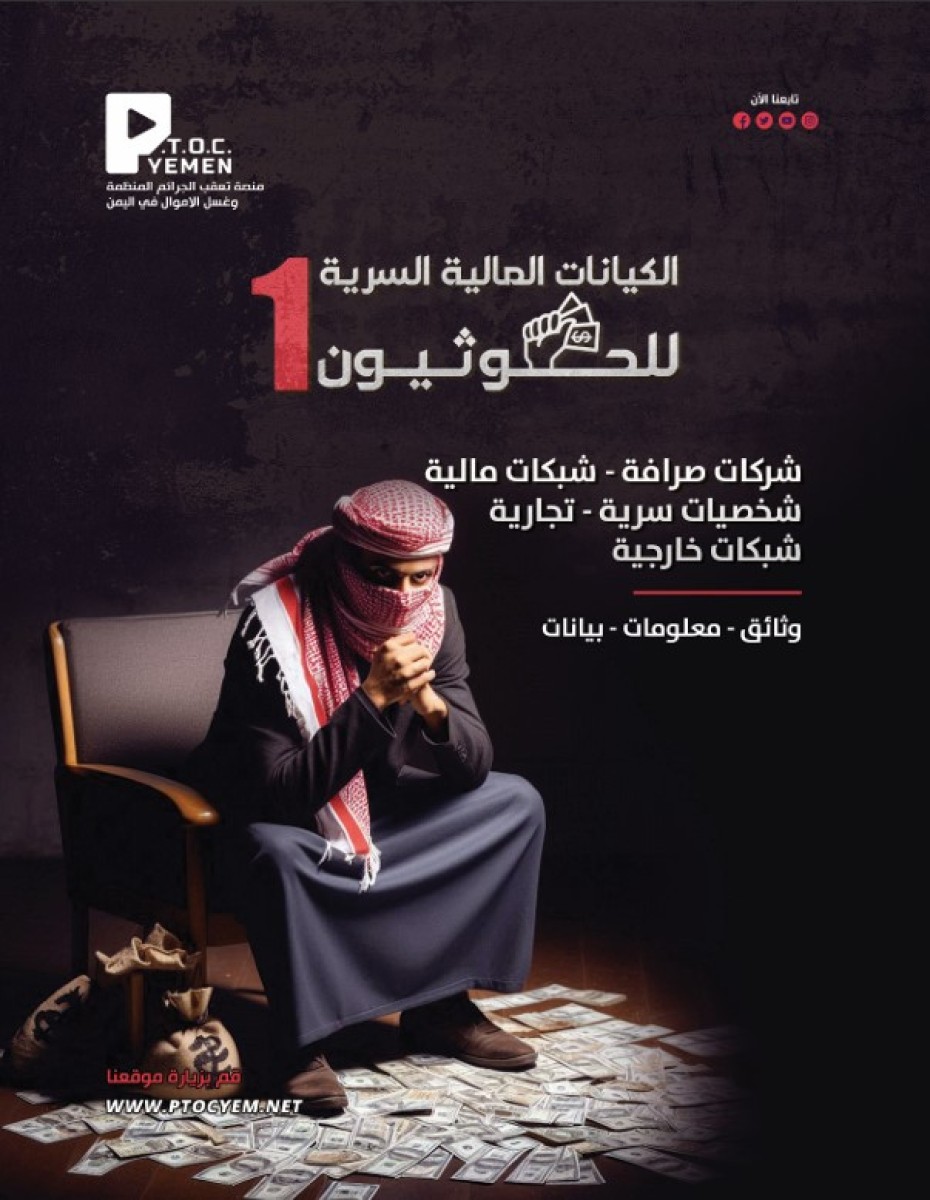The Platform for Tracking Organized Crime and Money Laundering in Yemen (P.T.O.C) issues its new report “The Secret Financial Entities of the Houthis”

The Platform for Tracking Organized Crime and Money Laundering in Yemen (P.T.O.C.) Issues its New Report "The Secret Financial Entities of the Houthis"
"Exclusive"
The Platform for Tracking Organized Crime and Money Laundering in Yemen (P.T.O.C.) has issued its second report entitled "The Secret Financial Entities of the Houthis", following its first report issued in early June 2024 under the title "The Secret Thieves". The platform continues its efforts to track the secret financial activities of the terrorist Houthi group inside and outside Yemen.
This report provides exclusive details and information that reveal the financial crimes committed by the Houthis and the systematic corruption operations carried out by the militia leaders to finance terrorism and money laundering, and to circumvent international sanctions, with the aim of prolonging the war and controlling the joints of the national economy.
The report contains data, documents and papers proving the involvement of hundreds of exchange companies, commercial companies and official entities in secret activities, all of which aim to enhance the financial resources of the Houthi militia, enabling them to continue local, regional and international wars, and enhancing the illicit enrichment of a number of their terrorist leaders at the expense of the suffering of the Yemeni people.
The platform revealed official and commercial documents of commercial companies and individuals linked to the secret financial wing of the Houthis, exposing the hidden financial system that Iran relies on to finance its arms in Yemen and the region.
The platform's report confirmed that Al-Rawda Exchange Company, owned by Muhammad Al-Hawri and Yasser Ali Al-Hawri, was established by the Houthis in 2019 with the aim of imposing control over the exchange market and financial transfers in addition to facilitating the transfer and laundering of Houthi militia funds.
The platform obtained documented information indicating that the Houthi militia is working to enable Al Rawda Company, under the cover of the Central Bank, to establish a unified financial network and cancel and disable the rest of the independent exchange networks and force the rest of the networks and exchangers to participate in it to circumvent international sanctions, which requires a strict international stance towards this dangerous step that harms the national economy.
The Houthi militia enabled Al Rawda Company to impose its financial control over the banking market and exercised the duties of the Central Bank under its control, as the volume of its financial movement reached more than 2.5 trillion Yemeni riyals.
The activity of Al Rawda Exchange Company is not limited to financial business and transfers only, but it is the largest financial arm of the Houthi militia, as the platform obtained new details and information revealing this large and complex financial network that was established suddenly.
After the US Treasury imposed sanctions on the company, the Houthi militia leaders worked to find a way out to avoid disrupting Al Rawda Exchange Company and the funds it manages. In this context, the (P.O.T.C) platform obtained a document revealing the change in the name of Al Rawda Exchange and Money Transfer Company (Mohammed Al-Hawri and Yasser Ali Mohammed Al-Hawri) to the "Mohammed Al-Hawri and Ali Oman Solidarity Company". The threads of tracking Qusay Al-Wazir's company led the Platform for Tracking Organized Crime and Money Laundering in Yemen (P.O.T.C) to more information and many details about the companies that facilitate money transfers for the Houthi group and commercial companies inside and outside Yemen. In this report, it is unique in publishing some of the money transfer documents. The platform also has minutes and contracts for oil deals belonging to Qusay Al-Wazir with figures linked to the Iranian Revolutionary Guard and Iraqi figures. The financial transfers of the minister's "Vio Oil" company show the connection of a banking network of the Houthi group to financial commercial operations, which is a group of limited companies, some of which were forced by the Houthi group in one way or another to work for them or confiscate their property, and some of which became identical to the Houthis in all financial and commercial aspects, even money laundering through these financial companies, which enabled the Houthis to obtain huge financial resources that helped them prolong the war and conflict in Yemen.
The report indicated that Zaid Ali Ahmed Abdul Rahman Al-Sharafi is one of the Houthi financial and secret leaders linked to the Iranian Revolutionary Guard and has a direct relationship with the commander of the Quds Force, Ismail Qaani. Zaid Ali Ahmed Al-Sharafi works within the framework of complex financial networks and owns, with his brother, his nephew and his family members, many companies and factories.
The platform confirmed in its report that Nabil Ahmed Nasser Al-Jawzi, the son-in-law of the leader Khaled Mohammed Khalil, head of the Department of Economics and Financial Affairs in the Houthi Security and Intelligence Service, granted Al-Jawzi the right to import non-essential food items to obtain large financial revenues. She pointed out that the Houthi militia appointed Ali Salem Al-Saifi in 2015 as the Undersecretary of the Ministry of Interior for Financial and Administrative Affairs from outside the Ministry of Interior, after imposing him as the financial official of the ministry to manage the money, budget and investments of the Ministry of Interior, which are estimated at tens of billions of riyals. As for Hussein Saleh Ayza Al-Mutai, he is one of the prominent traders in the Houthi group, and one of the influential figures in the field of oil derivatives trade. Al-Mutai has a complex financial network that is harnessed to serve the Houthi militia through a group of different import and export companies, especially in the fields of oil derivatives, spare parts, and agricultural pesticides.
Latest Comments